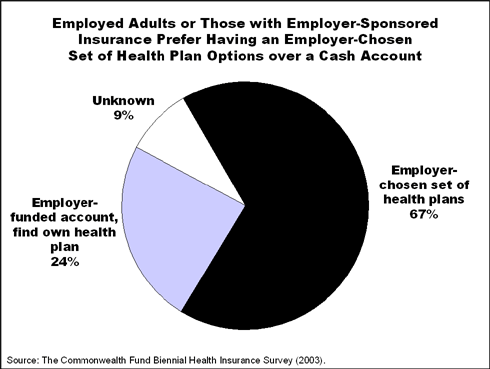New York City, September 22, 2005—Policymakers should be cautious about embracing the individual market and health savings accounts as a way to improve satisfaction with the health care system, according to a new Commonwealth Fund study authored by Jeanne Lambrew of George Washington University. Two of three adults who are working or covered by employer-sponsored insurance prefer that an employer select a set of health plans for them rather than provide them with an account to purchase insurance in the individual market, according to a nationally representative survey. This attitude is consistent regardless of political party affiliation: 69% of Republicans and 67% of Democrats prefer employer-chosen plans over employer-funded accounts.
The findings indicate that, in the employer-based insurance market, the ability to choose health care providers matters more to people than having a selection of health plans to choose from. About one-quarter (26%) of adults with employer-sponsored coverage who had no choice of providers said they were dissatisfied with their health care, more than double the rate of those with no choice of health plan (12% dissatisfied).

Over four of ten (43%) working-age adults report having a fair amount of choice in where they go for care, while 30% say they have a great deal of choice. This varies by the type of health insurance: 81% of those with employer coverage report a fair amount or great deal of choice, compared to 70% of those who have individual insurance.
"These findings suggest that the type of choice people most desire—where to go for care—may not be met by policies that promote a shift from employer-based coverage to individual market insurance," said Lambrew, associate professor of health policy at George Washington University.
"Choice" in Health Care: What Do People Really Want?, a new analysis of data from the Commonwealth Fund Biennial Health Insurance Survey of 3,293 adults ages 19 to 64, assesses attitudes toward choice and the employer-based health insurance system and provides new perspective on how people value certain types of choices.
Having a high income also increases the likelihood of having a choice of provider: four of five (81%) working-age adults with incomes of $60,000 or more have a fair amount or a great deal of choice, compared to about three of five (63%) with incomes below $20,000. However, lack of health insurance is far more likely to be linked to lack of provider choice than low income alone. Half of uninsured adults have little or no provider choice, compared with about one-third (35%) of all adults with low incomes, regardless of insurance status.
About half (53%) of those with employer-sponsored insurance have at least two health plans to choose from. The ability to choose a health plan increases with income level: nearly three of five (59%) adults with incomes of $60,000 and over have a choice of plan, compared with fewer than two of five (37%) with incomes under $20,000.
When asked about the value that they place on their employers offering them a choice of plan, 67% of those who had no choice of where to go for care thought it was very important. Yet, only 37% of those who had only one plan choice thought that having a plan choice was very important.
Almost three-quarters (72%) of people with employer-sponsored insurance report their employers do a good job selecting high quality health insurance plans. Even though respondents with employer-sponsored health care prefer to participate in such plans over those purchased independently, 74% are very or somewhat confident in their ability to choose, if they were faced with the decision. "While people are confident in their own abilities to choose a plan on their own, they still like their employers to do it for them," says Lambrew.
Other findings include:
- Working-age adults with individual insurance are more likely to say employers do a good job selecting insurance than do a bad job (47% vs. 22%).
- Among adults with individual health insurance coverage, 46% preferred employer-chosen plans over the 43% who preferred employer-funded accounts.
- The preference for employer-chosen health plans over employer-funded accounts persisted, even among those with no choice of provider (53%), who were very dissatisfied with care (53%), and who gave employers a mixed or bad review when it came to selecting a set of plan choices (57%).


